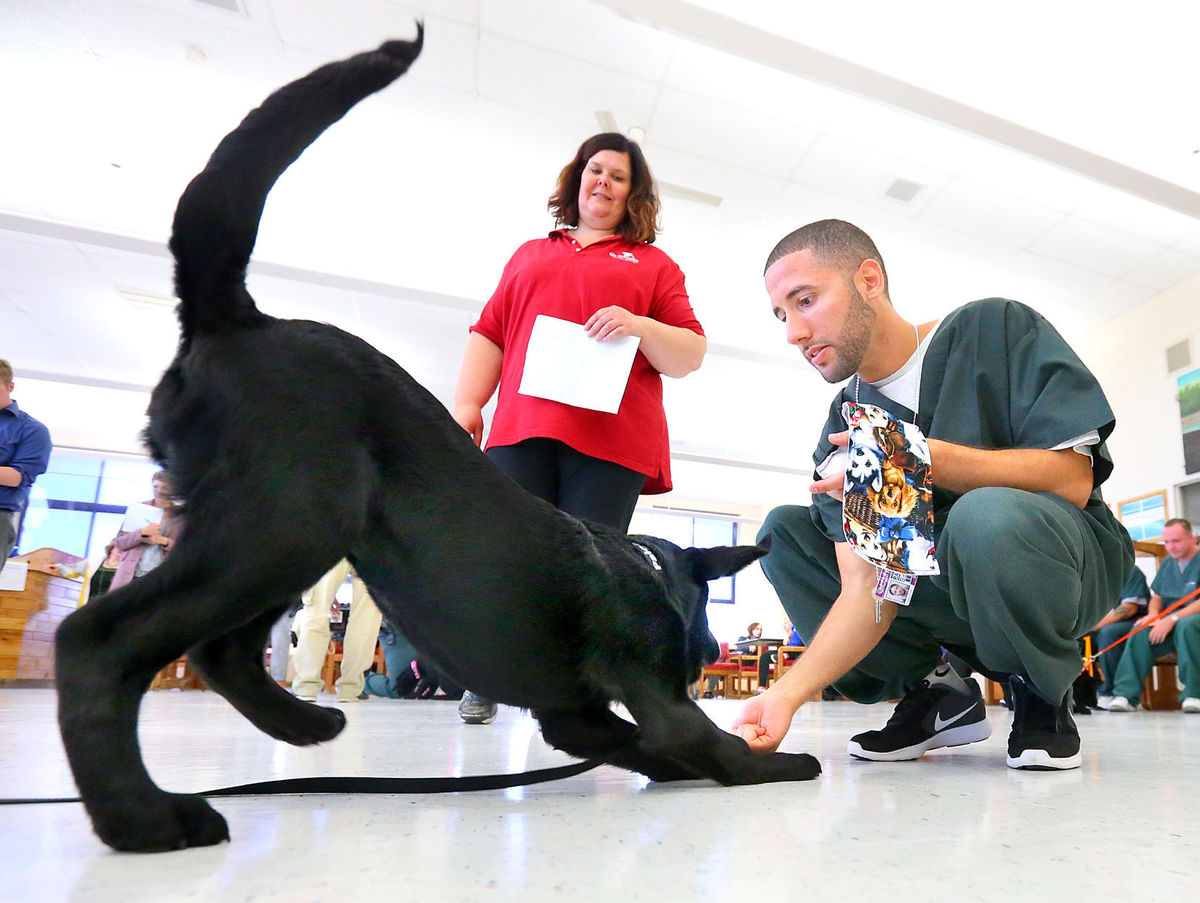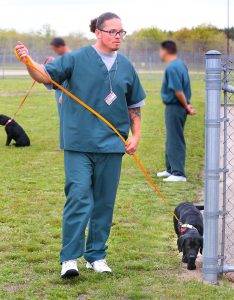
Emily Pyrek – May 28, 2017 (La Crosse Tribune) – Twenty-five inmates sat rapt at the edge of their seats as 10 rambunctious puppies came bounding into the Jackson Correctional Institute visitors room. Faces breaking into grins, the men reached out to greet the plucky pups who would be both their pupils and pals for the next year.
The canine/prisoner partnership, a first for the medium-security Jackson Correctional Institute, was arranged through Can Do Canines, a New Hope, Minn., based nonprofit that trains dogs of all breeds and sizes to help people with mobility challenges, hearing loss, diabetes, childhood autism and seizure disorders. The organization, formed in 1989, works with both individual volunteers and five other prisons in Minnesota and Wisconsin, and joined forces with Jackson Correctional Institution at the request of Warden Lizzie Tegels. Recently retired unit supervisor Steve Dougherty helped lay the groundwork.
“The benefit and enticement for me in having a program like this in our facility is it opens a very different facet of rehab for our inmates,” Tegels said. “It has a calming affect … and encouragement for good behavior. And to hire out (service dog) training for the duration is astronomically expensive.”
Indeed, once they complete two years of training, the black Labrador/Golden Retriever mixes, all from the same litter and given names starting with “P,” will be valued at $25,000 but given to those in need for just a $50 application fee. The minimal fee is made possible by the dedication of volunteers, who foster the dogs until four months of age and care for them on weekends, exposing them to public places, and the inmates, who are responsible for tending to the basic needs of the dogs as well as round-the-clock instruction. Two cellmates are assigned one dog (five additional inmates are designated “sitters,” filling in when needed), which is crated in their cell at night and by their side during the day. Commands of “sit,” “stay” and “down” are rehearsed frequently, as are basic manners.

Once a week, Can Do Canines prison program director Dyan Larson will lead a two-hour training session, with unit supervisor Melinda Derus overseeing day-to-day training.
“Prisons are a great source of people who have time on their hands to train,” Larson said. “Seventy-five percent of our dogs end up succeeding at the program.”
The success rate is important, given the 170 people on the waitlist for a Can Do Canine assistance dog.
“For a lot of people, the dogs are literally life-saving,” Larson said. “Everyone across the board is like, ‘How did I live without this?’ They gain freedom. They gain independence.”
Larson says the prison dog program has been incident free since it began a decade ago, and qualifying inmates must meet behavioral criteria and show a dedication to the program. Special consideration is given to those serving extensive sentences, as they have often run through all the available programming at the prison.
“I’ve been in prison for a while, and this gives me a good opportunity for my last six years,” said inmate Christopher Robertson, matched with dog Puzzle. “Just the whole concept is pretty exciting. It’s going to make the time go by really fast for a year, and hopefully, go by easier.”
Robertson and the other inmates delighted in their first training session, filled with laughter and the occasional bark. When a puppy finally passed the “food bowl game,” in which she isn’t allowed to eat until fully seated and given permission, the inmates broke out clapping. The dogs are also required to sit when having their leashes attached or waiting for their crate door to open.
“You need the dog to be calm and collected, because if you have someone with a mobility issue, they can’t be chasing after them,” Larson explained.
Inmate Lee Brooks was impressed with the early intelligence displayed by pup Portia and eager to lead her through milestones. In 2007, Brooks participated in the Fox Valley Humane Society Rebound program, in which prisoners train difficult-to-place shelter dogs, and found the experience rewarding and redeeming.

“We all make mistakes, and unfortunately I’ve made a couple,” Brooks shared. “Being able to do my part and give back … she’ll go to a good home and hopefully be able to pay it forward helping (her new owner).”
After their 12 months in the prison program, the dogs leave for final training. Larson calls the departure bittersweet and tearful, but she provides regular updates and films the dogs’ graduations for the inmates.
“I always say the inmates do grade school and high school with the dogs, then they go off to college and then they pick a career,” Larson said. “The prisoners cry when they have to give the dog up, but they’re still happy to have had the year.”
Tegels in confident the program will be a success, and hopes to bring in another round of puppies next year.
“The staff really think this is going to have a positive impact on not just the housing unit, but the facility in general,” Tegels said. “One of the (inmates) said he hadn’t touched a dog in eight years, and it was almost overwhelming for him. He said it was better than Christmas.”




